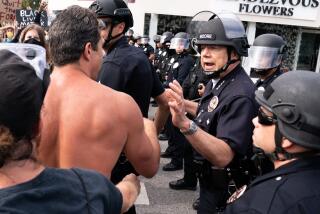Blame Laid on Ex-CIA Brass for Failures Before 9/11
- Share via
WASHINGTON — A classified internal CIA investigation singles out former CIA Director George J. Tenet and the former head of the agency’s clandestine service for failing to devote adequate resources to fighting the terrorist threat before the Sept. 11 attacks, according to intelligence officials who have read the report.
The report by the CIA’s Inspector General’s Office lays significant blame at the feet of Tenet, but goes further in its criticism of James L. Pavitt, the former deputy director of operations, recommending that the agency convene a special panel to determine whether Pavitt should be sanctioned.
The report and its recommendations represent the first time that the CIA has moved to hold any of its employees or senior officers accountable for failures surrounding the Sept. 11 attacks.
Tenet and Pavitt both left the agency last summer. Pavitt and a spokesman for Tenet denounced the report and rejected its conclusions, saying the two intelligence officials had fought vigorously throughout their tenures to secure more resources to fighting terrorism.
On Dec. 14, President Bush awarded Tenet the Presidential Medal of Freedom, calling him “one of the first to recognize and address the growing threat to America from radical terrorist networks.”
Tenet’s spokesman, Bill Harlow, called the criticism of the former CIA director “absurd.”
“No one in the U.S. government was more aggressive in calling attention to and dealing with the threat of terrorism prior to 9/11 than was George Tenet,” Harlow said in an e-mail to The Times. “He is confident that a fair reading of his record during this period would show that senior CIA officials were the most aggressive, resourceful and committed U.S. combatants in the war on terror at the time.”
Pavitt, in a phone interview, called the report “offensive.”
“The basic criticism is that it was a failure on my part and others to get appropriate resources to those parts of the organization that needed them,” Pavitt said.
“I don’t think it is an accurate portrayal of what the facts were at the time,” Pavitt said. “Claiming George and I or others didn’t put resources in the right place -- they can make the claim, make the charge and try to substantiate it. But the fact is nobody pled more forcefully for dollars than I did.”
A CIA spokesman declined to comment on the report, which is still considered to be in draft form.
The investigation, by CIA Inspector General John Helgerson, was conducted in response to a request in December 2002 from a joint congressional inquiry that the CIA determine whether and to what extent its employees were at fault for a series of breakdowns in the months before the terrorist strikes on New York and the Pentagon.
Although it had been expected that the inspector general’s report might identify low-level employees who had failed to pass on crucial information, few anticipated that it would be so aggressive in assigning blame to the CIA’s senior ranks.
It is not clear what evidence the report cited to support its criticisms of Tenet and Pavitt, but both men have been the targets of similar criticism in external probes conducted by Congress and by the independent bipartisan commission that investigated the Sept. 11 attacks.
In particular, both those investigations highlighted a memo that Tenet wrote in 1998 declaring “war” on Al Qaeda and calling for no resources to be spared across the intelligence community in confronting the terrorist network. Both the congressional probe and the Sept. 11 panel found little evidence that the intelligence community went on a war footing after that memo.
Pavitt acknowledged that the report includes a recommendation that recently appointed CIA Director Porter J. Goss convene a so-called accountability board to evaluate his performance and determine whether he should be sanctioned.
In Pavitt’s case, the most likely penalty would be a letter of reprimand placed in his personnel file. Pavitt said that he was recently allowed to read portions of the report that pertained to him, and that he has submitted a response disputing the characterizations of his performance.
Tenet also recently reviewed sections of the report on his handling of the terrorist threat, according to a former intelligence official, who said Tenet would also submit a written response challenging the report.
Harlow, the CIA’s spokesman during Tenet’s seven years as director, noted that Tenet raised funding for the agency’s counterterrorism center by more than 50% between 1997 and 2001.
“In the fall of 1998 he requested that the administration increase intelligence funding by more than $2 billion annually over the next five years,” Harlow said. “Only a small percentage of that request was approved.”
More to Read
Sign up for Essential California
The most important California stories and recommendations in your inbox every morning.
You may occasionally receive promotional content from the Los Angeles Times.













